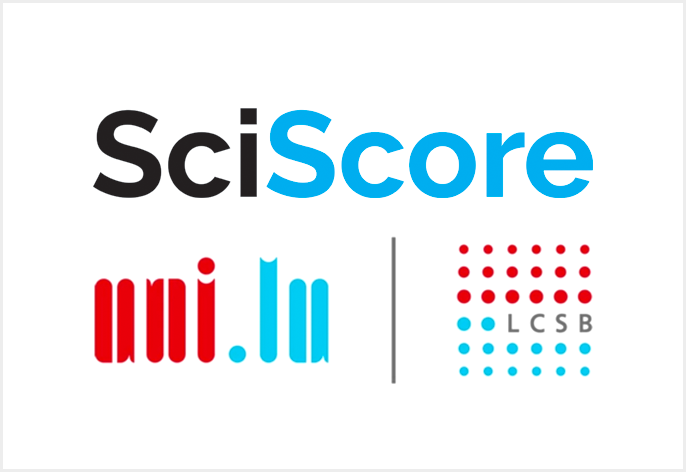
As part of a broad initiative aiming to guarantee research quality and reproducibility of scientific results, the Luxembourg Centre for Systems Biomedicine (LCSB) at the University of Luxembourg is partnering with SciCrunch Inc. The LCSB will be one of the first academic institutions to use SciScore – an automated validation tool for scientific articles – as part of its internal quality control process. It will contribute to further enhance the rigour and reproducibility of the publications written by LCSB’s researchers.
Scientific research always faces new challenges and, with the increasing volume of data, the complexity of new tools and the fast pace of modern science, ensuring that experiments can be repeated and results validated is as crucial as ever. Over the past years, the scientific community has widely acknowledged that the reproducibility crisis needs to be addressed in order to guarantee trust in the published literature and best use of valuable resources.
Early on, the LCSB recognised reproducibility as a very important topic and decided to tackle the issue by implementing measures to promote research quality. Grouped under the umbrella of the Responsible and Reproducible Research (R3) initiative, they include state-of-the-art IT infrastructures, GDPR compliant data processes and tools for high-quality scientific computing code. “A particular emphasis has been placed on a standardised publication workflow which will now be complemented through the development of a pre-publication check,” details Dr Christophe Trefois, leader of the R3 team.
This internal verification will monitor the compliance with the latest standards and high-quality of all manuscripts written at the LCSB, through a series of checks addressing issues such as plagiarism, data protection and source code quality. SciScore, through its rigor check, will be one of the main components in this pre-publication pipeline.
“Part of the recent research is not reproducible due to flaws in reference material, unreliable source identification, and similar issues,” explains Anita Bandrowski, Founder and CEO of SciCrunch, the company behind SciScore. “Our solution helps flag these issues before scientific articles become part of the permanent record.”
This automated validation tool verifies common rigor criteria and research resources in manuscripts. Scanning through the methods section of an article thanks to text mining techniques, SciScore detects whether the authors address issues such as bias, sample size, blinding, randomisation and more. It also analyses sentences that mention research resources – such as antibodies, cell lines, organisms and software tools – and determines how uniquely identifiable each resource is. SciScore performs this critical validation in roughly a minute, generates a score to assess the percentage of criteria met and provide a report that will help improve the rigor and reproducibility of the manuscript.
“As an integral part of the pre-publication check, SciScore will help LCSB authors ensure their manuscripts are better prepared for peer review,” says Dr Trefois. The tool will be first used to go through a database of all the articles published at the LCSB, giving a good insight into some reproducibility and transparency aspects of previous research. “Then, as the pre-publication check is gradually implemented, our scientists will be able to assess their new manuscripts quickly and accurately.” It will make it easier for authors to focus on the work-at-hand by indicating when, or if, something was overlooked or omitted. This immediate feedback will allow them to both learn best practices for writing the methods section and to directly implement the relevant changes.
“Most of the stakeholders in the scientific community have acknowledged the reproducibility issue and many academic institutions are currently developing strategies to address it but practical solutions are not yet widely implemented,” details Prof. Rudi Balling, director of the LCSB. “We made it a priority at the LCSB and we are very happy to be the first research centre to add SciScore to its toolbox to promote quality, transparency and reproducibility of science.”


























